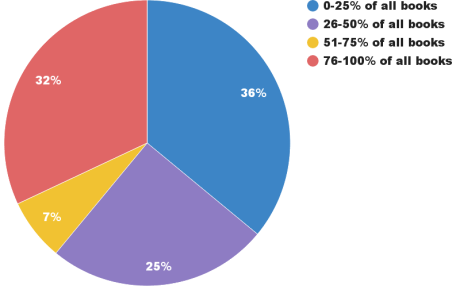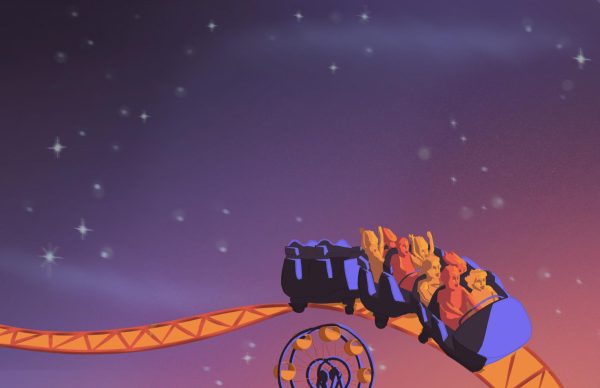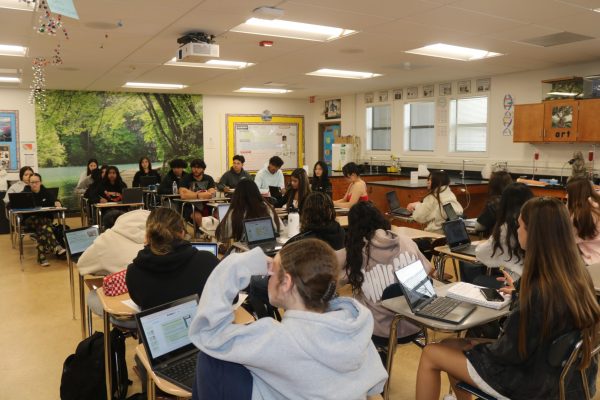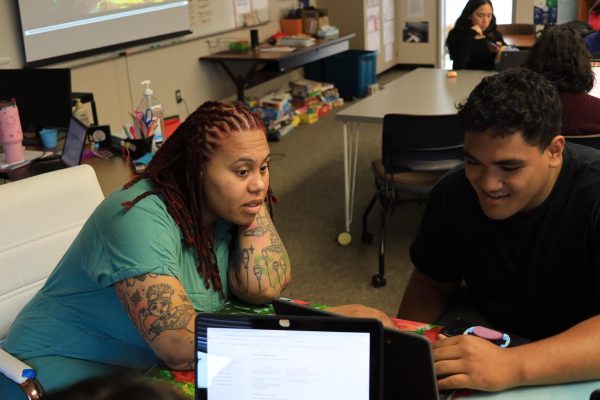To Shmoop or not to Shmoop?
To Shmoop or not to Shmoop?
That is the question that all students, regardless of their English class, have contemplated at one point in their high school careers.
Why not turn to a website such as Shmoop, Sparknotes, or Cliffsnotes that gives studentsclear, concise summaries and important quotes, when they’re in a time crunch or simply too lazy to read?
Students are regularly discouraged from doing any shmooping, cliffsnoting, or sparknoting in lieu of reading an actual bound book for their English classes.
Shmoop and Sparknotes, two of the most popular online tools for Cal High students, contain literature analyses, among countless other features such as lessons in other school subjects, standardized test preparation, career quizzes, and various posts by other users.
But most teachers claim that Sparknotes doesn’t provide students with sufficient information to fully comprehend and rightfully react to a classic masterpiece.
“I think it is important to expose students to a wide variety of literature to help them form their own critical perspectives,” said AP Literature and Composition teacher Jessica Heagle.
On the other hand, when a student has five AP classes, a job, extracurricular activities, or simply a bad case of senioritis, reading may just not be the best option for him or her.
“For a long time I avoided sparknoting,” said senior Chiena Ty. “But my time schedule and my lack of interest in reading some books has led me to Sparknote to know what’s going on.”
While there are students who read their books, many opt to use Sparknotes or Shmoop, either in lieu of reading or as a supplementary tool.
“I feel like it gives you more info to turn to,” said freshman Ta’lia Perkins. “And explains some things I don’t understand in the book.”
Some books are tough to get through, so students choose to not read them.
“I definitely did not read ‘My Sister’s Keeper’,” said senior Derek Beliso. “I think that a lot of the curriculum of senior year validates the plight of white Americans and so I decided to abstain from reading the book.”
There are many books on the required reading list for all grades that make students sigh with exasperation. Some books such as “David Copperfield,” a book that seniors in AP Literature and Composition read, are just too long.
“‘David Copperfield’ is 734 pages of complete nonsense,” said senior Elizabeth Madrieres. “[It is] overly descriptive. A waste of words.”
Madrieres prefers to use Shmoop for its abundance in detail, and she admitted she used it to get through the majority of her essays in AP Literature and Composition.
While these seniors say they survive through their AP English classes sans reading, for junior Samara Sorce, AP Language and Composition student, it is a different story.
“In AP lang the tests are more detailed,” said Sorce. “I read really late at night so I use Sparknotes to review.”
In regular English classes, the number of students who do not read the required book versus the students who do is mixed.
“I read Sparknotes because it’s easier,” said junior Lauren Jarvis. “The teachers don’t know. My teacher gives us summaries everyday so we don’t ever have to read.”
Sophomore Stephen Coll said he did not read a single book this year but did well on his tests.
“[Sparknotes] works,” said Coll.
Senior Samantha Jower, another AP literature and composition student, said she only just started replacing reading with online tools this year.
“A lot of books are so long, there’s no time, so you really don’t care,” said Jower.
Senior Deshawn Smith said everybody he knows uses Sparknotes.
“I don’t care,” said Smith. “All of [the required books] should be taken out because they suck and I hate reading.”
But senior Samantha Dalal has an opposing view toward reading.
“I really love all the books and I love reading,” said Dalal.
According to her, tests are easier if you read because of the details in the book.
Her words for peers who do not read? “It’s not my business.”
Senior Olivia Pomeroy also enjoys the books required for her English classes.
“I read the books and most are really good,” said Pomeroy. “But few are actually classics. ‘Lord of the Flies’ is not a classic! I use Shmoop only if I don’t understand what I’ve read.”
But reading remains a high priority in all English teachers’ minds.
“Reading allows you to think of the world outside of your bubble,” said English teacher Eghosa Obaiza. “You have to read the text. You have to see how the author was trying to portray the book. As you go to college, at some point you have to take responsibility and read the book and understand what’s going on.”
Even when English teacher Ted Levey was in high school, he understood the value of reading.
“Every English teacher at Cal is going to lie and say yes [they read all the books],” said Levey. “But I’m not lying and I absolutely read all the books in high school.”
Levey admits that he is not 100 percent sure which students of his use online resources in lieu of reading.
“I’m aware [resources] are out there,” said Levey. “I do try to write my quizzes around them, but it’s hard to keep up with all the new sites.”
And while many students seem to blow off reading as a waste of time, there rests a place for imagination in the world of literature.
For those who never pick up a book, others ask them to try reading a select few.
“‘Grapes of Wrath’ is a challenging but absolutely worthwhile read for kids who live in California,” said Levey.
Other junior favorites were “Catcher in the Rye,” according to Grewal, and “The Great Gatsby”, as recommended by Grewal, Pomeroy, and Jarvis.
“The best of the sophomore litter is ‘Lord of Flies’,” said Obaiza.
Dalal expressed that her favorite English 12 book was “The Kite Runner,” calling it “definitely worthwhile reading.”
Pomeroy also recommends any of Shakespeare’s work, which are sprinkled throughout the high school English curriculum.
On its website, Shmoop proudly states “We speak student. Education with a point of view.” Many students seem to take these words to heart.
But many remain convinced there rests value in the book itself.
“Reading is literacy,” said Obaiza. “Reading tweets isn’t reading so I hope kids pick up books.”






